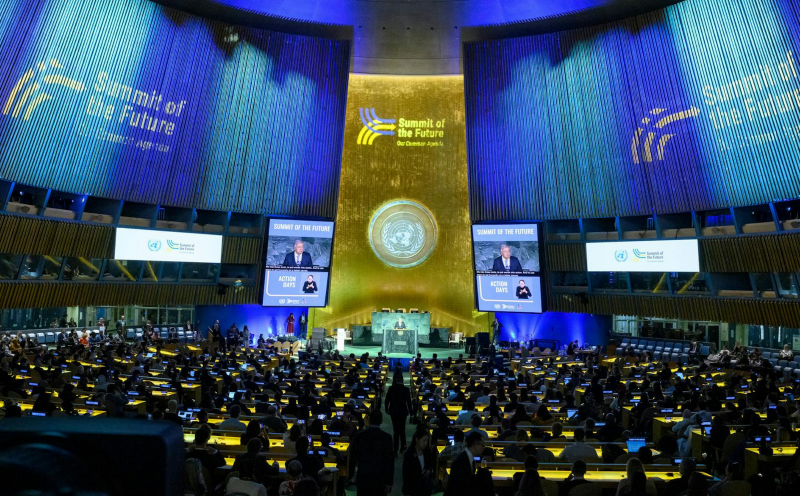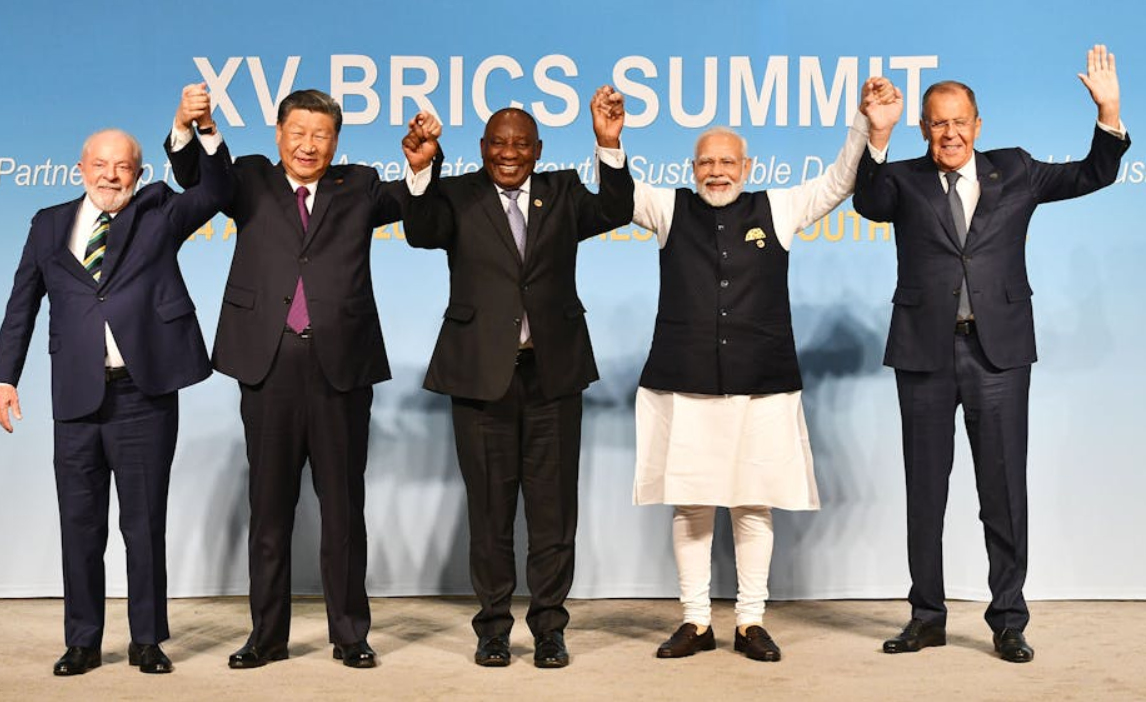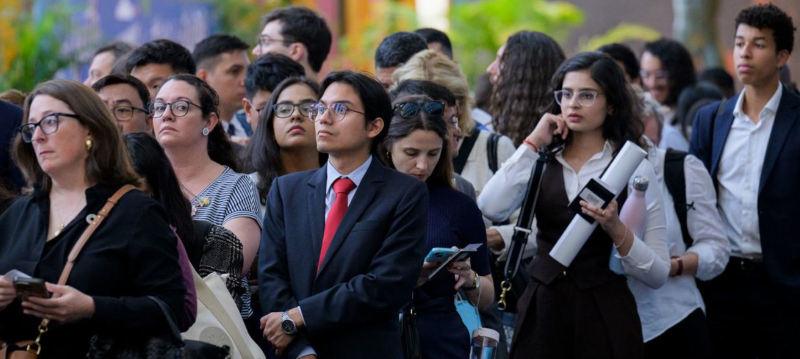Security Council Topic
| Security council | Topic | Member states | Links and documents | Contact |
|---|

The Pact for the Future was adopted on September 22, 2024 as the key outcome document of the Summit of the Future and it is a global agreement that aims to respond to the challenges we face in the 21st century. It envisions and promotes an inclusive future for all by focusing on pressing areas such as sustainable development, global governance, international financing and digital collaboration. In addition, it envisions a bold reform of the international system so that it becomes fairer and more efficient in solving global issues. The Pact also underscores the need to reform the Security Council. The United Nations Security Council (UNSC) was established in 1945 as the principal organ responsible for maintaining international peace and security. Today it consists of fifteen member states: five permanent members (China, France, Russia, the United Kingdom and the United States) and ten non-permanent members elected by the General Assembly for a two-year term. The role of the Security Council since its inception has been to resolve international crises. But this has become increasingly difficult and fraught with problems of all kinds. Security Council reform has thus become the most pressing issue in global governance of our time.
Negotiations on Security Council reform have taken place for years within the framework of International Negotiations (IGN) on Security Council Reform, involving several major groupings of countries, starting from 1993, with differing agendas and interests. Over time, certain “elements of consensus” have emerged and these have been endorsed by the Pact for the Future. Proposals for Security Council reform have taken many forms, but many have focused on the perceived need to enlarge the Council to address the serious deficiencies in representation which have only grown more acute as the United Nations gradually expanded over the second half of the 20th century. Aside from a minor reform in 1965 which added 4 new non-permanent members, the Council has remained frozen in time. Since the formation of the United Nations, the former “enemy states” Germany and Japan have become leading contributors to the international system, whereas countries of the Global South like Brazil and India rose to become leading players on the world stage. These four countries, forming the so-called G4 group, have traditionally been considered the leading candidates for new permanent members of the Security Council. Their candidacy efforts have however been fiercely opposed by their regional competitors, who aggregated to form the competing Uniting for Consensus group, also known as the “Coffee Club”, which opposes expansion of permanent representation. Achieving the necessary international agreement for reforms has been heavily undermined by the various overlapping interests and relationships between the countries and blocs. A major new development in this regard has been the rise of BRICS, which includes Brazil and India, as well as permanent members Russia and China, but also South Africa, a prospective permanent member candidate from Africa.  The explosive growth of the United Nations since its founding can be in great part attributed to the decolonization and self-determination processes in Africa, which gradually broke free of its historic shackles and colonial masters. African countries are today a force to be reckoned with in multilateral diplomacy and their views and opinions have become unavoidable. And yet, African countries, despite accounting for 18.3% of the global population, still lack permanent representation in the Security Council. The position of the African Union, as expressed through the Ezulwini Consensus adopted in 2005, is that the Security Council should be expanded to include at least two African permanent members and five non-permanent ones. The Pact for the Future endorses the desire of African states and other underrepresented regions for greater representation in the Security Council without committing to any specific solution, but underscores that the case of Africa in particular is a historical injustice which needs to be redressed. The African Union has been a key player in the aforementioned International Negotiations (IGN) framework and it is evident that any attempts to substantially reform the Security Council will require the backing of Africa while delivering on Africa’s key demands.
The explosive growth of the United Nations since its founding can be in great part attributed to the decolonization and self-determination processes in Africa, which gradually broke free of its historic shackles and colonial masters. African countries are today a force to be reckoned with in multilateral diplomacy and their views and opinions have become unavoidable. And yet, African countries, despite accounting for 18.3% of the global population, still lack permanent representation in the Security Council. The position of the African Union, as expressed through the Ezulwini Consensus adopted in 2005, is that the Security Council should be expanded to include at least two African permanent members and five non-permanent ones. The Pact for the Future endorses the desire of African states and other underrepresented regions for greater representation in the Security Council without committing to any specific solution, but underscores that the case of Africa in particular is a historical injustice which needs to be redressed. The African Union has been a key player in the aforementioned International Negotiations (IGN) framework and it is evident that any attempts to substantially reform the Security Council will require the backing of Africa while delivering on Africa’s key demands.
The ambitious agenda outlined by the Pact for the Future faces major obstacles in its implementation, especially when it comes to its proposed changes to global governance. A key obstacle is the issue of the veto, which is held by the five permanent members of the Security Council. This mechanism has often prevented the Security Council from addressing urgent global issues. Achieving an agreement to abolish or limit the use of the veto is a major challenge that will have to be resolved through negotiations. The veto-bearing permanent members of the Security Council have traditionally opposed reforms perceived as diluting their power, but there is now meaningful momentum in the international community to overcome disagreements and find a solution.
 For as long as the Security Council has existed, a pressing issue has been the inclusion of more parts of the world, in accordance with the growth of the United Nations. In addition to Africa, the regions of Latin America and Oceania have also been discriminated against in the work of the Council, and should be included more along with many more regions of the world. The efficiency of the Council is of great importance, as right now the geopolitical developments are moving too fast for the Council to keep up and any proposed enlargement has the potential to make the Council more impotent. Transparency is a pressing need as well, as the Council’s decision-making processes and actual work are unknown to world leaders and the general population. Furthermore, the relationship between the Security Council and the General Assembly is another issue of paramount importance. The General Assembly is the largest and most inclusive deliberative body of the United Nations. It is the main policy making organ, and as such depends on the work of the Security Council greatly. Right now, the relationship between the two bodies needs work, due to the Security Council not being able to agree on how to resolve major issues affecting the world. More cooperation and due diligence between the two organs is necessary to improve the work of the UN as a whole.
For as long as the Security Council has existed, a pressing issue has been the inclusion of more parts of the world, in accordance with the growth of the United Nations. In addition to Africa, the regions of Latin America and Oceania have also been discriminated against in the work of the Council, and should be included more along with many more regions of the world. The efficiency of the Council is of great importance, as right now the geopolitical developments are moving too fast for the Council to keep up and any proposed enlargement has the potential to make the Council more impotent. Transparency is a pressing need as well, as the Council’s decision-making processes and actual work are unknown to world leaders and the general population. Furthermore, the relationship between the Security Council and the General Assembly is another issue of paramount importance. The General Assembly is the largest and most inclusive deliberative body of the United Nations. It is the main policy making organ, and as such depends on the work of the Security Council greatly. Right now, the relationship between the two bodies needs work, due to the Security Council not being able to agree on how to resolve major issues affecting the world. More cooperation and due diligence between the two organs is necessary to improve the work of the UN as a whole.
Despite all the disagreements and conflicts over the issue of Security Council reform in the international community, the Pact for the Future reflects a growing fundamental consensus. The Security Council cannot be left to go on without reform because it is no longer fit for purpose. The institutions of global governance cannot be held hostage for all eternity by the five great powers which emerged at the top after the Second World War. This sentiment is perhaps best summarized by the words of President Erdoğan of Turkey - “The world is bigger than five”.

- How can the Security Council be made more representative without becoming too large and unresponsive?
- Should the scope and use of the veto power be restricted and should potential new permanent members have the veto?
- What should be the role of the General Assembly when the Security Council fails to fulfil its role?
